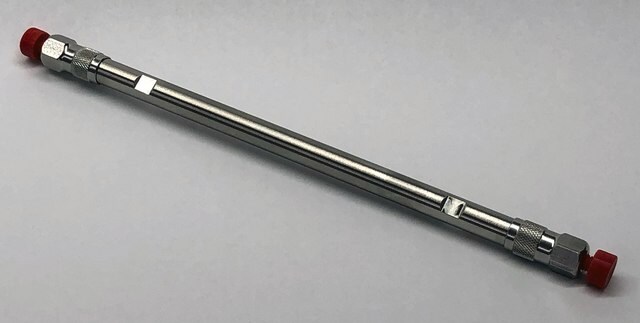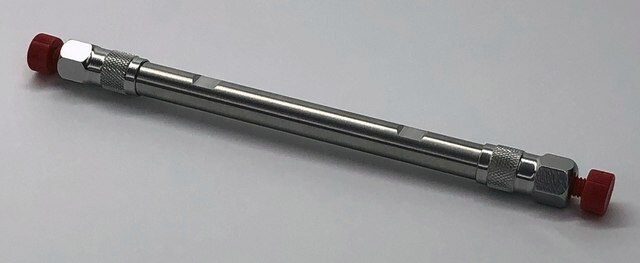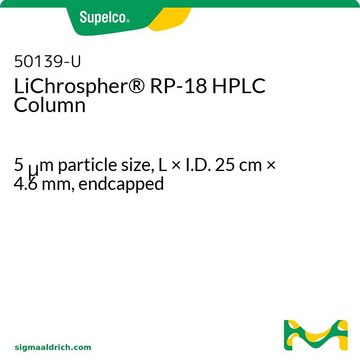53352-U
Ascentis® Express 90 Å Phenyl-Hexyl (2.7 μm) HPLC Columns
L × I.D. 10 cm × 4.6 mm, HPLC Column
Synonyme(s) :
Core-shell (SPP) Fused Core Phenyl HPLC column
About This Item
Produits recommandés
product name
Ascentis® Express Phenyl-Hexyl, 2.7 μm HPLC Column, 2.7 μm particle size, L × I.D. 10 cm × 4.6 mm
Matériaux
stainless steel column
Niveau de qualité
Agence
suitable for USP L11
Gamme de produits
Ascentis®
Caractéristiques
endcapped
Fabricant/nom de marque
Ascentis®
Conditionnement
1 ea of
Paramètres
60 °C temp. range
600 bar max. pressure (9000 psi)
Technique(s)
HPLC: suitable
LC/MS: suitable
UHPLC-MS: suitable
UHPLC: suitable
L × D.I.
10 cm × 4.6 mm
Superficie
135 m2/g
Impuretés
<5 ppm metals
Matrice
Fused-Core particle platform
superficially porous particle
Groupe de la matrice active
phenylhexyl phase
Taille des particules
2.7 μm
Dimension de pores
90 Å
Plage de pH
2-9
Application(s)
food and beverages
Technique de séparation
reversed phase
Vous recherchez des produits similaires ? Visite Guide de comparaison des produits
Catégories apparentées
Description générale
Application
- A fully automated and fast method using direct sample injection combined with fused-core column on-line SPE-HPLC for determination of ochratoxin A and citrinin in lager beers: Demonstrates the robustness of the Ascentis® Express Phenyl-Hexyl, 2.7 μm HPLC column in automating the detection of contaminants in beverages. This study showcases the column′s capacity for high throughput analysis, essential for quality control in the food industry, ensuring safety and compliance with regulatory standards (Lhotská et al., 2016).
- Advantages of core-shell particle columns in Sequential Injection Chromatography for determination of phenolic acids: This research highlights the efficiency of the Ascentis® Express Phenyl-Hexyl column in analyzing complex phenolic compounds, illustrating its superior performance in environmental and pharmaceutical applications. The column′s design enables enhanced separation capabilities, crucial for accurate phenolic profiling in various samples (Chocholouš et al., 2013).
Informations légales
Vous ne trouvez pas le bon produit ?
Essayez notre Outil de sélection de produits.
Colonne de garde
Nécessaire, mais non fourni
Produit(s) apparenté(s)
Code de la classe de stockage
11 - Combustible Solids
Classe de danger pour l'eau (WGK)
WGK 3
Point d'éclair (°F)
Not applicable
Point d'éclair (°C)
Not applicable
Faites votre choix parmi les versions les plus récentes :
Certificats d'analyse (COA)
Vous ne trouvez pas la bonne version ?
Si vous avez besoin d'une version particulière, vous pouvez rechercher un certificat spécifique par le numéro de lot.
Déjà en possession de ce produit ?
Retrouvez la documentation relative aux produits que vous avez récemment achetés dans la Bibliothèque de documents.
Articles
Improve your reversed phase selectivity for polar aromatics and heterocyclic compounds with the Ascentis® Express Phenyl-Hexyl U/HPLC column.
Protocoles
RP-Amide and HILIC, both amenable to the analysis of polar compounds, were successfully used to resolve several beverage components, including sugars, vitamins, sweeteners, preservatives, and caffeine.
Notre équipe de scientifiques dispose d'une expérience dans tous les secteurs de la recherche, notamment en sciences de la vie, science des matériaux, synthèse chimique, chromatographie, analyse et dans de nombreux autres domaines..
Contacter notre Service technique




